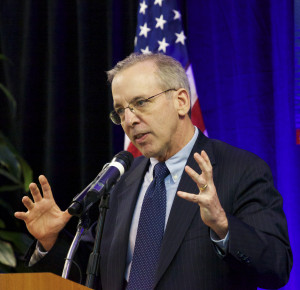Dudley cautions on Fed taper
Federal Reserve Bank of New York President William C. Dudley said that the central bank may start to slow its buying of mortgage-backed securities and U.S. Treasury bonds sooner than expected.
“We believe a very aggressive monetary policy today will generate stronger growth sooner,” Dudley told members of the Business Council of Fairfield County July 1 at the Sheraton Stamford Hotel. “And that will allow us to lead to a normalization of monetary policy sooner than if we were to stop this policy now and raise short-term rates earlier.”
In an attempt to improve labor market conditions in the context of price stability, the Fed”™s Federal Open Market Committee (FOMC) buys $40 billion in mortgage-backed securities and $45 billion in treasury bonds every month. But as the economy continues to grow, FOMC predicts it might begin to reduce its asset purchases sooner and halt by the second half of 2014.

Fairfield County is a part of the Second Federal Reserve District, served by the New York Fed. Dudley addressed members of the Business Council as a part of a brief tour of the county, which included meetings with Stamford business leaders, Bridgeport Mayor Bill Finch and representatives of the Connecticut Housing Development Fund, Sikorsky Aircraft Corp. and workforce development group The WorkPlace Inc.
Last month, U.S. Federal Reserve Chairman Ben Bernanke announced the FOMC would likely moderate the pace of asset purchases later this year, which already has triggered a chain reaction among bond traders and investors. However, Dudley stressed the tapering wasn”™t hardwired to a calendar date and was subject to change.
“If labor market conditions and the economy”™s growth momentum were to be less favorable than in the FOMC”™s outlook ”” and this is what has happened in recent years ”” I would expect that asset purchases would continue at a higher pace for longer,” he said.
Dudley alluded to a similar situation in the late 1990s and early 2000s, when Japanese authorities had pulled back on monetary policy accommodations prematurely and as a consequence, were unable to escape the deflation dynamics on its debt.
“So it is very important U.S. monetary authorities and government (representatives) work hard to get the U.S. economy to achieve escape velocity,” Dudley said. “So we don”™t have to worry about falling back.”
Nationwide, about three-quarters of all jobs have been recovered from the last economic downturn and several economic indicators, such as housing and employment, suggest a full recovery is on its way, Dudley said. But in Fairfield County, it”™s not as clear. Only about 60 percent of the 36,000 jobs lost during the recession have been recovered, and less than half have been covered statewide. Connecticut was also the only state to see its economy shrink in 2012, as reported by the U.S. Bureau of Economic Analysis.
As long as the FOMC continues to buy securities and bonds, even at a reduced rate, Dudley said the Fed would be adding monetary policy accommodation, not tightening it, putting downward pressure on longer-term interest rates. The rate at which the Fed will make its purchases, however, will all depend on the national economic recovery.